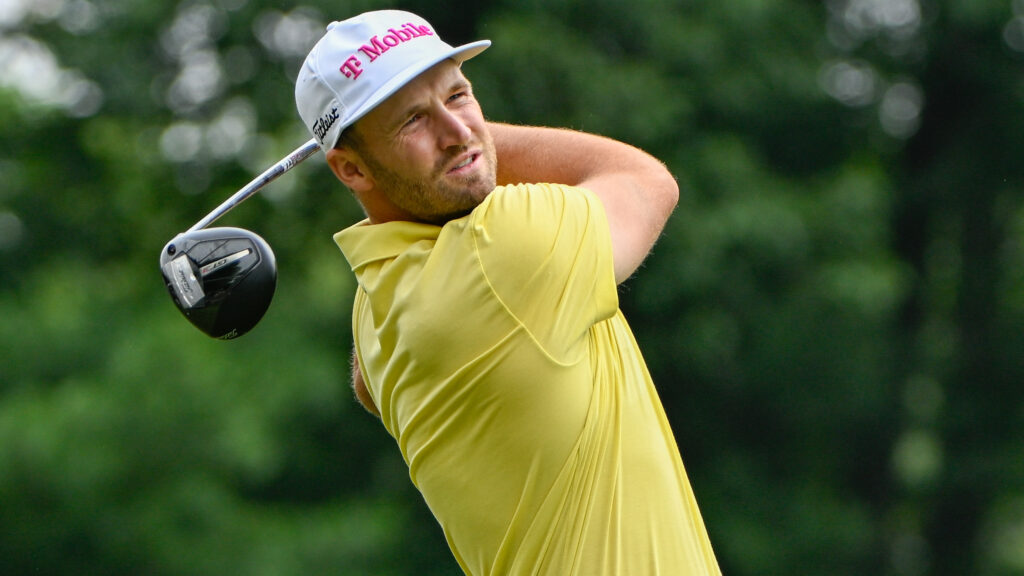Wyndham Clark’s Rollercoaster Ride: From US Open Frustration to Travelers Championship Redemption
In the world of professional golf, the stakes are high, and the pressure can be immense. Wyndham Clark, the reigning US Open champion, recently faced a whirlwind of challenges that illustrate both the mental strain of the sport and the highs and lows that come with it. During the 2023 US Open held at the notoriously difficult Oakmont Country Club, Clark struggled significantly, finishing on eight over and becoming one of several high-profile players to miss the cut. This disappointing performance ignited a series of events that drew media attention and highlighted Clark’s emotional journey.
Oakmont, known for its punishing layout and unforgiving greens, proved to be a formidable opponent for many golfers, including heavyweights in the sport. As the tournament progressed, it was evident that frustration was a common theme among participants. Notably, Rory McIlroy was captured on camera unleashing his emotions as he slammed his club into a tee marker during the second round. This moment, magnified online, reflected the intense pressure that can engulf even the most seasoned professionals.
In a particularly striking incident, Clark reportedly caused damage to several lockers in the locker room after missing the cut at Oakmont. This outburst, alongside his previous actions at the PGA Championship, where he destroyed a T-Mobile sign, has raised questions about his behavior under pressure. Although we understand that golf is as much a mental game as it is a physical one, such instances prompt discussions on the importance of emotional regulation in sports.
Following the tumultuous US Open, Clark shifted gears and turned his focus to the Travelers Championship at TPC River Highlands. After an impressive opening round of six-under par, he spoke to the media, expressing regret over his actions at Oakmont. "I’ve had a lot of highs and lows in my career, especially this year. I made a mistake that I deeply regret. I’m very sorry for what happened," Clark stated candidly. His willingness to confront his mistakes head-on reflects a maturity that can sometimes be lacking in high-pressure situations.
Clark’s subsequent performance at the Travelers Championship demonstrated his resilience. With a stellar opening round of 64 that featured seven birdies, he showed that he had managed to put the frustrations of the US Open behind him. "It was great. Man, I hit a lot of great shots," he noted. This turnaround not only boosted his confidence but also reignited hopes for qualifying for the FedEx Cup Playoffs and securing a spot on the Ryder Cup team.
Emotional outbursts are not uncommon in sports, and they can stem from the immense pressure athletes face. Golf is both a mental and physical test, and players like Clark often grapple with the weight of expectations from fans, sponsors, and the media. The incidents at Oakmont and the PGA Championship illustrate that even top athletes are susceptible to losing composure, reminding us that perfection is an unattainable ideal in competitive sports.
The aftermath of Clark’s initial frustrations begs the question: how can golfers better manage the emotional challenges that accompany such high-stakes tournaments? One potential avenue lies in fostering a supportive culture among players, where openly discussing mental health and emotional resilience becomes the norm. Organizations such as the PGA Tour could prioritize workshops and resources aimed at enhancing the emotional well-being of athletes, helping them navigate the intense pressure they face.
As Clark aims for redemption, the focus shifts from his past mistakes to his future aspirations. With the Ryder Cup and FedEx Cup Playoffs on the horizon, he is looking to channel his experiences into a more productive performance. "I’d also like to move on, not only for myself but for Oakmont, for the USGA," he expressed, highlighting his desire to heal and evolve from the incidents.
The journey of a professional athlete is often fraught with challenges, requiring mental fortitude and emotional resilience. For Wyndham Clark, the tumult of the past few tournaments serves as a reminder of the importance of learning from one’s mistakes. Golf fans will undoubtedly be watching closely as he attempts to turn the page and embrace the opportunities ahead, demonstrating that every setback can pave the way for future success.
As Clark continues to compete, one can hope that this chapter in his career encourages dialogue about mental health in sports, inspiring both athletes and fans to approach the game— and life— with a balanced mindset. It is crucial for athletes like Clark to understand that mistakes are part of the journey, and what truly matters is how they rebound from those mistakes. In the world of golf, and indeed in life, it’s not just about the fall but also about the rise thereafter.


